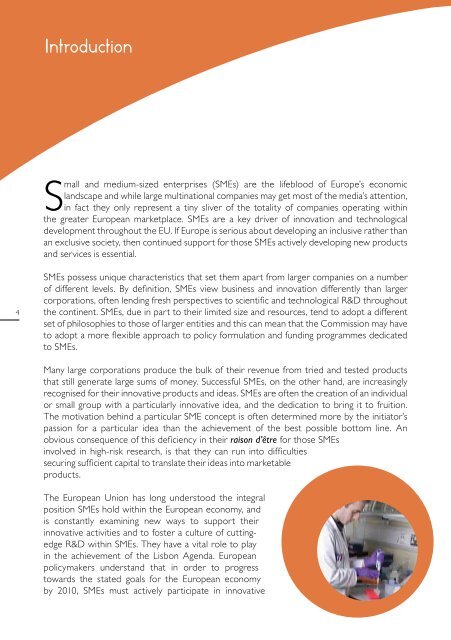SMEs and Research - European Commission - Europa
SMEs and Research - European Commission - Europa
SMEs and Research - European Commission - Europa
You also want an ePaper? Increase the reach of your titles
YUMPU automatically turns print PDFs into web optimized ePapers that Google loves.
4<br />
Introduction<br />
Small <strong>and</strong> medium-sized enterprises (<strong>SMEs</strong>) are the lifeblood of Europe’s economic<br />
l<strong>and</strong>scape <strong>and</strong> while large multinational companies may get most of the media’s attention,<br />
in fact they only represent a tiny sliver of the totality of companies operating within<br />
the greater <strong>European</strong> marketplace. <strong>SMEs</strong> are a key driver of innovation <strong>and</strong> technological<br />
development throughout the EU. If Europe is serious about developing an inclusive rather than<br />
an exclusive society, then continued support for those <strong>SMEs</strong> actively developing new products<br />
<strong>and</strong> services is essential.<br />
<strong>SMEs</strong> possess unique characteristics that set them apart from larger companies on a number<br />
of different levels. By definition, <strong>SMEs</strong> view business <strong>and</strong> innovation differently than larger<br />
corporations, often lending fresh perspectives to scientific <strong>and</strong> technological R&D throughout<br />
the continent. <strong>SMEs</strong>, due in part to their limited size <strong>and</strong> resources, tend to adopt a different<br />
set of philosophies to those of larger entities <strong>and</strong> this can mean that the <strong>Commission</strong> may have<br />
to adopt a more flexible approach to policy formulation <strong>and</strong> funding programmes dedicated<br />
to <strong>SMEs</strong>.<br />
Many large corporations produce the bulk of their revenue from tried <strong>and</strong> tested products<br />
that still generate large sums of money. Successful <strong>SMEs</strong>, on the other h<strong>and</strong>, are increasingly<br />
recognised for their innovative products <strong>and</strong> ideas. <strong>SMEs</strong> are often the creation of an individual<br />
or small group with a particularly innovative idea, <strong>and</strong> the dedication to bring it to fruition.<br />
The motivation behind a particular SME concept is often determined more by the initiator’s<br />
passion for a particular idea than the achievement of the best possible bottom line. An<br />
obvious consequence of this deficiency in their raison d’être for those <strong>SMEs</strong><br />
involved in high-risk research, is that they can run into difficulties<br />
securing sufficient capital to translate their ideas into marketable<br />
products.<br />
The <strong>European</strong> Union has long understood the integral<br />
position <strong>SMEs</strong> hold within the <strong>European</strong> economy, <strong>and</strong><br />
is constantly examining new ways to support their<br />
innovative activities <strong>and</strong> to foster a culture of cuttingedge<br />
R&D within <strong>SMEs</strong>. They have a vital role to play<br />
in the achievement of the Lisbon Agenda. <strong>European</strong><br />
policymakers underst<strong>and</strong> that in order to progress<br />
towards the stated goals for the <strong>European</strong> economy<br />
by 2010, <strong>SMEs</strong> must actively participate in innovative
















